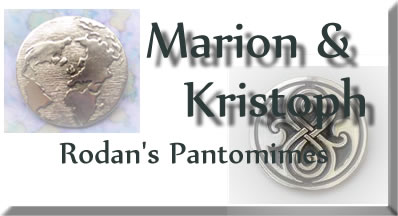
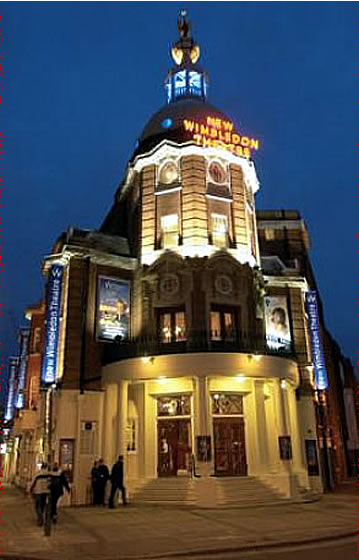
Rodan had been studying the Earth phenomena of pantomime. It was not a subject her private tutors had chosen for her, but one she elected to study for herself. Marion was delighted in her interest in a uniquely Human art form and helped her to find the materials for her project – photographs and colourful programmes from pantomimes in all of its most glorious eras.
When Kristoph suggested that they might go to see a pantomime in the run up to the Christmas festivities her hardest problem was deciding which pantomime in which time. In the end she narrowed it down to three.
The New Wimbledon Theatre on the main Broadway of that London Borough was not actually new in the year 2013. In fact, it was a hundred and three years old, an Edwardian monument to the theatrical arts. It’s first production in 1910 had actually been a pantomime called Jack and Jill, but Rodan had chosen it as the venue for one of the glossy pantomimes of the television celebrity era.
“This production is unusual,” she told her foster parents as they sat in the front row of the dress circle with a marvellous view of the stage as well as the stalls below. Rodan had rejected the idea of taking one of the beautifully refurbished boxes. She wanted to see the pantomime the way ordinary people would see it.
“Unusual how?” Marion asked her.
“The genie is played by a lady,” she explained. “Usually the genie is a man, although there is no actual rule about that. But in this case it is played by this lady who is a famous comedian and actress on the television broadcasts.”
Marion glanced at a colour photograph of the alternative comic Jo Brand in a multi-hued genie costume of gauze and silk that was a contrast to the feminist black she wore in her usual act. There were more ironies there than simply having a woman in a traditionally male role.
“Aladdin’s mother is played by a man,” Rodan went on explaining. “On Earth, it is considered funny when a man wears clothes that women usually wear.”
“I think it would be funny on Gallifrey, too,” Kristoph remarked. “But nobody has that kind of sense of humour. Besides, the formal robes of office are ridiculous enough without wearing lace up bodices.”
Marion giggled. The television presenter and comedian Matthew Kelly looked ludicrously feminine in his Widow Twankey costume. She tried to imagine him in the Panopticon among the High Councillors and laughed even more.
And the pantomime hadn’t even started, yet.
By the time it did she was thoroughly ready to laugh. In the past year she had been entertained by some of the best and most talented people in the dominion planets of Gallifrey. She had seen operas and concertos, ballet, acrobats, plays and musicals, comedies and tragedies of all sorts. There could not be a form of performing arts she had not seen.
But this was refreshingly ordinary, the kind of entertainment she was used to before she had become the wife of a Time Lord. Some of the more topical jokes puzzled her. This pantomime was taking place more than ten years after she stopped being a citizen of Earth. The Prime Minister of Britain had changed at least twice since and most of the celebrities of the day were unheard of in her time. But she understood when those people were being made fun of and laughed with the rest of the crowd.
Rodan loved the colour and the music, and especially the audience participation. She shouted as loudly as any other child when the villain was creeping up behind the hero. She sang along when the Genie encouraged everyone to join in with a simple, silly little song.
But she wasn’t just an ordinary child. She was a Gallifreyan child and a Time Lord candidate who had faced the Untempered Schism only half a year ago. At the same time as she enjoyed the pantomime as a pure entertainment she carefully analysed it in a very Gallifreyan way, considering the greed and the duplicity of Abanazar, the gullibility of Aladdin, even the nature of genies.
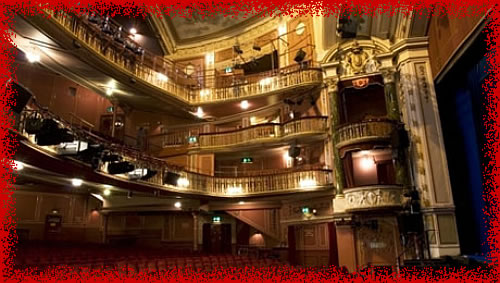
“Is it possible that the lamp might be dimensionally transcendental like a TARDIS?” she wondered aloud as they walked out of the theatre in the dark of the winter evening and Kristoph scanned the Broadway for brightly lit shopfronts that indicated eating places.
“That is quite possible, indeed,” he agreed as he decided against the far too commercialised Nando’s and both the Stage Door steak restaurant and the Gourmet Burger kitchen next door to it. He liked a good steak, but the restaurant didn’t look very child-friendly. He liked a burger now and again, but he was sceptical about the idea of a gourmet one.
In the opposite direction he located a pizza restaurant with a warm, inviting frontage. There were already three families with children choosing their post-pantomime supper. Rodan agreed with her foster father that it would do nicely.
“Aladdin was lucky to live in a society that does not have rigid social strata,” Rodan commented when she had chosen a selection of salad to eat while her pizza was being cooked. “On many of the worlds we visited last year, he would never be permitted to marry the princess.”
“That is perfectly true,” Kristoph agreed. “I’m not sure it would even have been possible in the ancient Orient where the story comes from in the usual way of things.”
“It doesn’t matter,” Marion said. “It is a story, a sweet, fun story. It doesn’t matter if it is true or not. Rodan, dear, you don’t have to worry about details like that. Didn’t you enjoy the pantomime?”
“Oh yes,” she assured her foster mother. “But I did wonder why the policemen were so silly. They should have known that Abanazar was a bad man. The Chancellery Guard would be much smarter.”
Marion shook her head and smiled wryly. Rodan WAS a Gallifreyan child. She enjoyed being entertained, but nothing stopped her thinking about things at the same time. Even as she laughed at the antics of the pantomime horse she would be considering how the two men inside managed to work it, and comparing their ungainly movements with the elegant gait of a real horse – about which she was fully expert. She would see the genie appear out of the lamp and at the same time as she thought about the trapdoor arrangement on the stage and the smoke machine that created the effect she would wonder if a genie could actually exist in a lamp that was built on the same principle as a TARDIS.
Perhaps it was their fault, Marion wondered as she glanced across the table at Kristoph. If they hadn’t taken her out of her normal life, shown her the wonders of the universe, introduced her to so many creative and colourful ideas, it wouldn’t be a problem. She would be an ordinary Gallifreyan child who analysed and understood everything with the mind of a scientist or a philosopher.
After they had eaten they walked back to the TARDIS, parked in the theatre car park disguised as a car. Marion put Rodan to bed and then came back to the console room. They were in flight already and she sat on the sofa in front of the big viewscreen letting the image of the vortex soothe her.
“Next stop, Edwardian Cardiff,” Kristoph said as he came to sit next to her. “After a good night’s sleep, anyway. I don’t think Rodan intended us to see three pantomimes one after the other without a break.”
“We’re lucky she settled on three,” Marion answered. “The first list had fifteen on it.”
“She can grow up and get her own TARDIS and visit as many pantomimes as she likes,” Kristoph commented. “If she can get around the ‘frivolous use of time travel’ clause.”
“How do WE get around that clause?” Marion asked out of curiosity.
“Educational purposes,” Kristoph answered dryly. “Though I’m not sure the Prydonian Masters would see it that way.
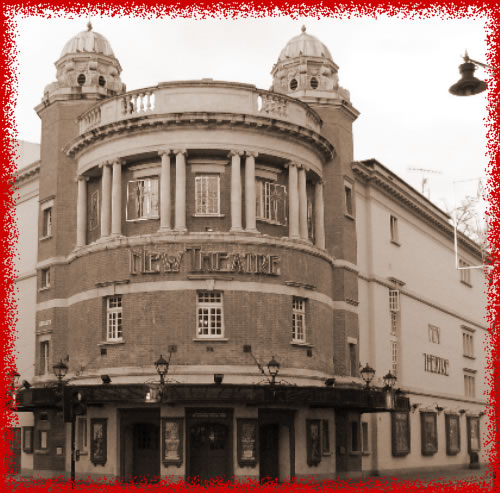
The New Theatre, Cardiff, actually WAS quite new in 1909, having opened in December of 1906. Built in one of the new, genteel, Edwardian districts of the city its pantomime mainly attracted the middle class people of the area who arrived in horse drawn cabs dressed in frock coats and evening dress, their children in miniature versions of the adult clothing. There were some well dressed working class people in their cleanest and neatest clothes, too. They arrived on foot and purchased tickets for the upper circle.
Kristoph arranged for his family to arrive in a very fine carriage that caused people to turn and look to see what gentry were patronising the theatre tonight. They had cause to keep looking. Kristoph looked every inch the Edwardian gentleman of means in his frock coat and top hat. Marion was wearing a pale blue silk dress and a wide brimmed hat, with a dark blue cloak to keep out the cold of a frosty night. Rodan was in pale green with a bonnet and shoes to match. She looked prettily demure as she walked into the theatre at the side of her foster parents.
This time Kristoph had insisted on a box. He said it was because he hated sitting in the ordinary seats before the invention of underarm deodorants but Marion was sure he was joking about that. They had been to the Globe Theatre in Shakespeare’s own time when bodily cleanliness was a very dubious matter and he hadn’t minded. They had mingled with the ordinary patrons of a Victorian music hall, too.
Of course I’m joking,” he assured his wife. “I AM an aristocrat, though. I miss the personal service you get when you take a box.”
The personal services included chocolates and sweets for Marion and champagne – not the best, perhaps, it being a provincial theatre, but recognising that Kristoph was an important patron. Rodan sucked a sweet and studied the programme for the evening’s performance of Cinderella.
This was long before the age of television, and while the concept of ‘celebrity’ certainly existed pantomime didn’t really attract the top ‘stars’ of quality theatre. The performers were mostly music hall stalwarts. Cinderella was played by a pretty young woman with a sweet contralto singing voice. The Ugly Sisters were a pair of middle-aged comedians who were known for a slapstick style double act and Buttons a young acrobat making his mark on variety bills in the South Wales area. Prince Charming was a tenor who had actually won a prize at an Eisteddfod and was something of a catch for the production – the closest thing they had to a ‘star’ on their bill.
They were very good performers, and though the more topical jokes were lost on the time travelling family the music hall songs that Cinderella and the rest of the cast sang were easy enough to listen to, and even sing along to when invited to do so.
Pizza had not been invented in this time. After the performance Kristoph bought hot roast chestnuts from a street vendor and they walked for a time around the fine buildings of the civic district of Cardiff, a large town that had still not become a city, and had not yet been officially designated as the capital of Wales, but had a dignity of its own nonetheless.
When the chestnuts were finished they found their way into Cathays Park where a statue of Queen Victoria had appeared early in the evening. Anyone passing it would have recalled that it had been there as long as the park had been established. Later, they would not worry about the fact that it had disappeared.
Much later, the Welsh National War Memorial would be built on that same spot. Kristoph spared a thought to that future monument and its significance as he closed the door to the TARDIS and set their next destination.
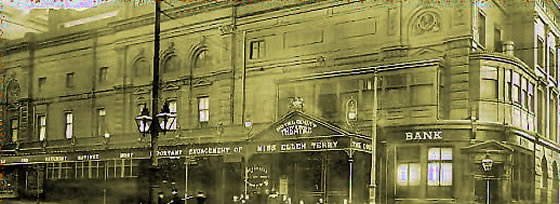
In her own time, Marion knew the Royal Court Theatre, Liverpool as a Victorian building sandwiched between the 1960s St. Johns Shopping Centre and the 1970s bus interchange. She knew the area around it as a bustling modern retail district.
But this was 1947. The Liverpool city centre she knew hadn’t yet been built, and the centre the people of this time knew had been bombed out of existence by the Luftwaffe. Standing in front of the theatre she could see an empty swathe of darkness broken by occasional lights. It was hard to see clearly but Marion suspected that the emptiness went all the way down to the riverside. It wouldn’t be Lord Street and the other streets she had grown up with for another twenty years.
It might have been depressing if she had been allowed to dwell on it, but Kristoph swept her into the bright theatre foyer where he bought chocolates and a programme for the colourful performance of Jack and the Beanstalk.
This WAS 1947. The people in the audience around them were dressed in the austere styles of post war rationing, but they were ready to forget about the uncertain future for a few hours and enjoy themselves.
Underarm deodorants had still not been invented, which proved that Kristoph had been joking the last time, because he had purchased seats in the very front row of the stalls, directly in front of the stage. Rodan was pleased with the seats.
She was even more pleased when the pantomime was in full swing and the actor playing Jack came down off the stage to pick out children from the audience to join him in a song. Rodan was thrilled to be among those chosen. She clambered up the steps with seven other youngsters and held hands in a line singing ‘Over the Rainbow’ from the Wizard of Oz, a film that had been released before the war began.
Kristoph carefully reached into his pocket and brought out a small, discreet, but very anachronistic object. Nobody but Marion noticed him hold up the mobile phone with a camera built in. The photograph was taken instantly and he hid it in his pocket again.
“A souvenir of the occasion,” he whispered. Marion smiled. Why not indeed.
Rodan was smiling widely when she descended from the stage clutching a small bag of off-ration sweets that was a prize for her performance. She was full of excitement and delight about her moment of glory. It kept her smiling all the way through the rest of the show and at the end she clapped and cheered loudly as her hero, Jack, took his bow with the rest of the cast.
“I think that was the best of the three,” she said as they walked back to the TARDIS, parked just outside Lime Street railway station.
“Only because you got sweets out of it,” Marion teased her, but Rodan didn’t mind. She had satisfied her curiosity about pantomimes. Her experience of one more aspect of the Human custom called Christmas was quite complete.
The sweets were a bonus.
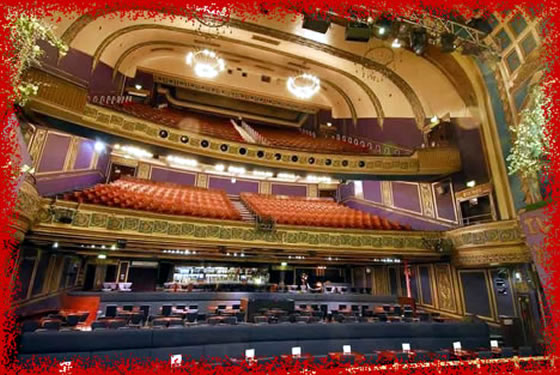
 |
 |
 |